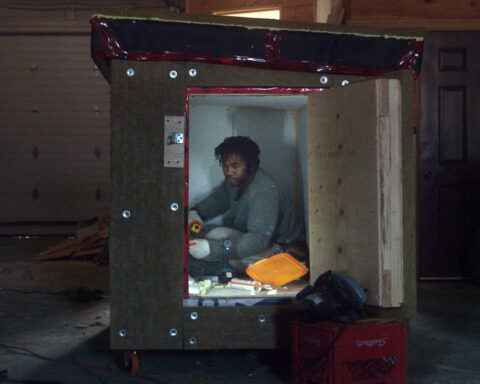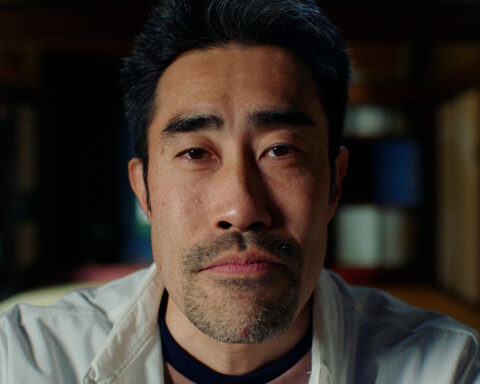Mathieu Roy and Harold Crooks’s new documentary Surviving Progress opens with an arresting series of images: a pair of chimpanzees puzzling over the correct placement of two wooden blocks in a white-walled laboratory. One of the chimps is having difficulty getting an L-shaped block to stand on its end; as the sequence goes on, his consternation scans as palpably human. The quick cut immediately thereafter to a shot of astronauts floating outside a space station high above the Earth would be disorienting if it also wasn’t so clearly an allusion to the interspecies leap at the beginning of 2001: A Space Odyssey (1968). A ballsy shout-out, perhaps, but it’s appropriate. Like Stanley Kubrick’s epochal masterpiece, Surviving Progress is a film about a world in thrall to—and perhaps at the mercy of—the byproducts of human ingenuity.
While Kubrick and Arthur C. Clarke (and many others) may have gotten to these ideas first, Canadian author Ronald Wright’s 2004 text A Short History of Progress is generally regarded as one of the seminal contemporary works about the obvious pros and complicated cons of social and technological advancement. Framing his discussion around French post-Impressionist Paul Gauguin’s 1897 painting Where Do We Come From? What Are We Doing? Where Are We Going?, Wright attempts to answer vast, searching questions with precise, detailed analysis. The book traces a line through the agricultural upheavals of the Stone Age and the sophisticated (and doomed) societies of the Romans and Mayans to our own unprecedentedly intricate and precarious post-industrial period.
Wright’s ideas about the erosion of our “natural capital” and the overconsumption of resources that shall ultimately prove to be finite are relativelyfamiliar. His true rhetorical coup is his concept of a “progress trap,” which he defines as an innovation that, in solving one problem, creates an entirely new one. Appearing onscreen in Surviving Progress, Wright uses the example of early human hunters to delineate the difference between figuring out how to more efficiently kill a single woolly mammoth and devising a means of driving them over a cliff en masse. The latter, in his opinion, is a “progress trap”—a great leap forward that’s actually a big step backwards. In one of his interview segments in Surviving Progress, he lays his rhetorical cards on the table: “We’re now reaching a point,” he says, “at which technological progress and the increase in our population and our economy threaten the very existence of humanity.”
This is a troubling sentiment, of course, but in spite of the severity of its conclusions, A Short History of Progress proved surprisingly popular in book form and as part of the Massey Lectures series for which it was commissioned. To promote the book, Wright toured the country, talking about the material with live audiences and also over the radio on CBC’s Ideas programme. “I remember listening to the radio one evening in August of 2004,” says Daniel Louis, the Genie award–winning film producer best known for cofounding Cinémaginaire in 1988 with Denise Robert. “I was hooked in. I sat in my car in the garage for 20 minutes after I’d gotten home. And the whole time I was thinking: Could we make a movie out of this?”
The answer was yes, but it took nearly six years for Louis and Robert and a long list of collaborators to figure out exactly what the finished product would look like. At first, Robert offered the project to her husband, Denys Arcand, but he turned it down; the same thing happened when they approached François Girard. But the director of The Red Violin offered a suggestion of somebody he thought would be perfect for such a sprawling and ambitious project: Mathieu Roy, a young filmmaker who had directed the elegant profile piece François Girard’s Three-Act Journey (2005) and worked as Martin Scorsese’s assistant on The Aviator (2004). “François arranged a meeting with Daniel Louis, and he agreed to hire me as the director,” says Roy. “I think that they were both charmed by the fact that I was young, passionate—and pointed out that it was my generation who would have to deal with these overwhelming issues anyway.”
After reading Wright’s book, Roy realized that the lack of a clear narrative was going to be the biggest challenge. Where a comparable Massey Lectures text like Margaret Atwood’s Payback: Debt and the Shadow Side of Wealth (itself being made as a film by Jennifer Baichwal) has a number of obvious thematic through lines and motifs and a relatable colloquial authorial voice, A Short History of Progress is more obviously academic, and with a daunting historical and geographical scope. “I had a fascinating ride trying to figure out the format that the film would take,” says Roy. “I remember saying once to Daniel that the film was going to be a symphony of civilization! Baraka, Manufactured Landscapes and Gambling, Gods and LSD were films that were pretty much on my mind. I wanted to succeed in making a film about the overwhelming idea of Progress without a word or with very few. But that wouldn’t fly for long!”
Roy also describes a version of the film that would have been a kind of docu-fiction, revolving around a character played by an actor who would have been a catalyst for philosophical inquiry—an idea he now dismisses as “too gimmicky.” Surviving Progress retains a certain visionary element, expressed through brilliantly executed time-lapse photography sequences. A God’s-eye image of a city skyline swirling with orange-tinted traffic matches up poetically with Wright’s comparison of urban sprawl to an unchecked forest fire. But the film also utilizes other, more conventional documentary tactics: archival footage, location shooting (in Brazil and China) and talking-head interviews with Wright and a host of other interested parties, including Atwood, Jane Goodall and an array of cognitive psychologists, animal researchers, population scientists and other experts who engage with the author’s theories from a variety of different vantage points. The result is a film that’s simultaneously fluid and transporting, as in Roy’s original conception, but also meticulous and methodical in a way that transcends simple sensory overload.
This ultimate sense of balance may have something to do with the fact that the film has been made with the input of a number of different parties. Around the same time Roy was hired, the National Film Board became involved in a developmental capacity (NFB Ontario Centre producers Silva Basmajian and Gerry Flahive later became full-fledged co-producers in February of 2008), and, in 2007, Betsy Carson and Mark Achbar joined the project as co-producers. (Martin Scorsese’s name also appears on the credits, although he worked mostly in an advisory capacity.)
For Achbar, Surviving Progress represented an opportunity to develop some of the ideas that had underwritten The Corporation (2003) from a slightly different angle—not to mention a chance to use that film’s critical and commercial success as a way to help seed other filmmakers’ work. “The Corporation looked at a pervasive societal phenomenon and tried to make it seem as strange as it actually is,” says Achbar. “Similarly, Surviving Progress challenges popular conceptions of what constitutes progress. Each of the 10 feature documentaries I was able to support with the envelope funds The Corporation generated reflect an aspect of my own concerns and interests; otherwise, I would not have become involved. Other budget and financing criteria were imposed by Telefilm, but the premise of my envelope was that Telefilm had no say on the creative side. Of course, I had to have confidence that the teams I backed could pull off what they proposed.”
It helped that there was a personal connection: Achbar’s wife, Siobhan Flanagan, was already working on Surviving Progress as a script consultant. From there, Achbar invited his Corporation co-narration writer Harold Crooks onto the project to work with Roy on the script and as a co-director. (Roy retains the official title of “director”.) Crooks, a seasoned documentary screenwriter whose work includes the wry, perceptive Pax Americana and the Weaponization of Space (2009) and George Ungar’s The Champagne Safari (1995), says the biggest incentive was the chance to work with a group of countrymen with whom he might not have otherwise crossed paths. “For an Anglo of my generation to be working with Cinémaginaire, a film company at the heart of popular Québécois culture, was an unimaginable opportunity,” he says. “And, as it turns out, a deeply gratifying experience. Planet Cinémaginaire and Planet Achbar inhabit different film universes but they share one very important thing in common. Both have infinite respect for ‘M. et Mme. Tout Le Monde.’ They are natural-born populists in the best sense of the word.”
The question of “populism” is worth bringing up with regard to Surviving Progress. Its six-year gestation process places it at the tail end of a cycle of “downer docs” released in the wake of An Inconvenient Truth. At this point, even the sort of discerning, politically sensitive audience that attends art-houses and documentary festivals may have gotten their fill of movies soberly proclaiming that we’re going to Hell in a handbasket. A book like A Short History of Progress can be sobering because at this point, serious readers are a self-selecting audience; when it comes to filmgoing, however, even the most intelligent among us will often opt for escapism, and not only in the realm of mainstream, special-effects blockbusters. The makers of documentaries are no less susceptible to the demands of the market than the people churning out multiplex fare, and it’s arguable that there’s more at stake when they’re forced to compromise.
Achbar believes that it’s possible to balance the imperatives of accessibility and ideological clarity—tricky though it may be. “My goal with media is to get people to think, to care, to act. With any film I’m involved in I do what I can to help make the film clear and emotionally and intellectually engaging, and to inject humour where it might be appropriate. With this film, that meant streamlining and making accessible the intellectual content, heightening emotional moments, reducing imagery that distanced viewers, lessening repetition and, in one instance, using sound effects comically.” He’s referring to some strenuously wacky carny-midway music underneath images of frantic stock traders—a less austere version of Antonioni’s cutting burlesque of high finance in L’Eclisse (1962). Not exactly subtle. Yet coming shortly after footage of Ronald Reagan bloating about the joys of “turning the bull loose” at the New York Stock Exchange, a little caustic levity feels earned.
The shots at Republican cowboys may be de rigeur, but the focus on economic issues is completely valid. Surviving Progress started shooting on the eve of the 2008 credit crisis, and the filmmakers would have been blind—not to mention dishonest—if they hadn’t integrated that fresh sense of panic into the material. C-SPAN clips of congressmen dressing down bank executives fold neatly into selections from sword-and-sandal epics about Roman decadence; shots of eroded Mayan temples blend seamlessly into shots tracking over pockets of tacky McMansions.
“We felt like we had to keep readjusting,” says Robert. “It was important to stay up-to- date.” Crooks agrees and emphasizes the effort to keep things rooted in a present tense. “It was decided early on that the film couldn’t be a history lesson,” he says. “Instead it would seek to identify Wright’s two major recurring civilizational threats—living off the capital rather than the interest of nature and the self-destructive ecological and human effects of ruling elites at the top of the social pyramid—in the present interlocked global reality.”
By the time the film reached the editing room in the fall of 2009, it had assumed some kind of shape, even if Achbar recalls being a little nervous down the home stretch. “I’m a newbie to this executive-producer business and I tended to be skeptical longer and focus on problematic details,” he says. “It was only after the bumps were ironed out that I was able to more fully engage with the big picture and contribute effectively on that level. Louis-Martin Paradis, the editor, calmly and deftly navigated the often-conflicting vectors of five executive producers, three producers and two directors, with the patience of a saint.”
Despite Achbar’s mention of conflicting vectors, Roy and Crooks sound positively united on the question of whether some kind of pessimism-fatigue could hamper Surviving Progress’ reception. Both filmmakers insist that these considerations are beside the point and were far from their minds as they were shaping the material. “I have read that important societal ideas actually really only take off and spread after they’ve become familiar,” says Crooks. “Hopefully this will be the case with Surviving Progress as it finds its audiences.
What we believe to be unique about our film is not so much the emphasis on the eco-collapse narrative but our probing of our genes, our brains and our dangerously hierarchical behaviour for clues to possible ways out of Wright’s progress traps.”
“From the wider filmmaking perspective,” adds Roy, “it’s always better to proceed without thinking in those terms!” He’s talking about the self-fulfilling prophecy whereby films labelled “difficult” or “challenging”— even in an admiring way by critics or programmers—are subsequently avoided by suspicious filmgoers. The picture painted by Surviving Progress may seem dark, but there are glimmers of illumination (including a bookending sequence with the chimps that literally and figuratively suggests the possibility of balance). And while Roy surely isn’t naive about the commercial prospects of a film that demands engagement in lieu of escapism, there’s a touch of optimism in his words. “Look at what happened with [the success] of The Corporation. People saw some truth there. We’re hoping people will be hungry for the kind of truth we’re suggesting with our film as well.”











